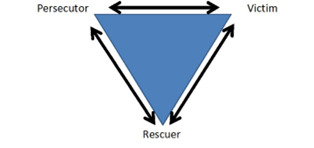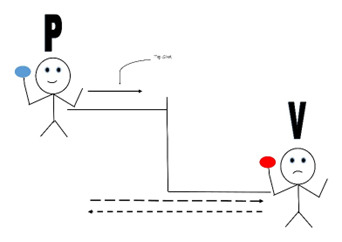
"Games People Play" Well, some people
It's draining and leaves you feeling helpless. It's a protection racket to avoid rejection but at a huge cost for all the participants. There are no winners in this game and the way out is to stick with the Top-shot
2/28/20254 min read


OK, you have to be really old to remember the song, and though the book, by Erick Berne, was over elaborate, the basic ideas behind Transactional Analysis are pretty useful and usable.
At the heart of gamey relationships is manipulation and a lack of authenticity.
A useful model to capture the dynamics of these relationships is Karpman’s Triangle. He suggests that in any gamey relationship there are only three positions to hold, Persecutor, Victim and Rescuer. The holding of these positions is dynamic and it’s the switch that is integral to it being a game. Manipulation is key to any game. So, one person will present themselves as a victim of, (take your pick) life/circumstance. The other person(s) locked into the Game will find the task of rescuing him/her irresistible. Then as soon as they’ve done the rescuing, they feel like the victim of whoever had the original problem, now in the position of Persecutor.
Fairly soon the whole thing resets itself - till the next time.
You’ll see some good examples of gamey behaviour in Motherland where Amanda, the posh one, will announce to the group her problems taking her girl to the orthodontist on Thursday and Jonathan to cricket practice. They all look at their shoes, till Ann, the Irish one, says that she could take him. With little in the way of thanks, Amanda then says that praps she could pick him up after tea. So, Amanda presents herself as a Victim of circumstance. She doesn’t ask of the gang, “Hey, can any of you guys take Jonathan to cricket practice on Thursday, I’m double booked with the Orthodontist?” She’s fairly confident that simply announcing her dilemma will elicit an offer of rescue from Ann, but just in case an offer doesn’t come, she hasn’t risked rejection. In this case she gets what she’s after with no risk to her ego and as a bonus gets him fed too.
My hunch is that you have to learn this stuff early on, in the family you grow up in and then extended to the world at large. It’s often handed down the generations. Individuals who, as children, have been cast in the role of Victim may continue as such but intriguingly, can take up the Persecutor role, though I suspect to do so, they have to cut themselves off from the feelings of helpless and hopeless they experienced when they were the nominated Victim.
When I used to give “talks” (I avoid them now), I’d describe the mechanics of how these gamey relationships work and half the audience would be nodding, Victims - Rescuers would recognise this instantly. I found out later that some of those nodding were Persecutors - Victims, who would recognise just how dreadful the whole thing was but fail to recognise themselves as ever being Persecutors – most odd.
One aspect that becomes obvious in these gamey relationships is that they preclude intimacy, rather like similar pole magnets. In fact, the arch manipulator may announce that “We’re a very close family” and the Victim children may repeat the family myth. When I enquire of these Victims,, “In what way close?” There’s often a hesitation in identifying such closeness…..”No, I don’t suppose we are really,” is often the answer.
There’s a common pattern to the communication within these gamey relationships where the meaning of what’s being communicated is hidden whilst what’s said is a camouflage for what’s meant.
Ping-Pong Communication




The game is clearly rigged in favour of the Persecutor.
In the interactions, the Victim may get a few good shots in but is going to lose.
Lose how? By getting got by what wasn’t said.
For instance, the daughter phones her mother to ask if she’d like her to get her some shopping from Sainsbury’s or if she’d like to go with them to the pub for Sunday Tea.
The mother replies that pehaps she could get her a piece of salmon – just a small piece.
A fly on the wall could have judged this interaction as entirely benign – indeed, in other circumstanced it may well be so.
What the fly couldn’t know, is that the mother knows that the daughter knows that she’d love to be taken out to tea but not to the Waggon and Horses, where they intend to eat on Sunday. And that she’s very disappointed in her daughter's choice of venue. The familiar “failed again” feeling is what the daughter experiences.
The chances are that the daughter won’t entirely enjoy the Sunday tea with her family for the guilt she takes with her to the gastro-pub, and she’ll endeavour (and fail) to make amends the following week. The salmon will still be in the fridge on Monday.
The daughter could have asked if her mother would like one of those little pats of butter, stayed with the Top-shot and choose to only deal with top-shots from now on. In which case she might talk breezily of who they saw in the pub, remark on the beef and the sweet course and make no remark on the salmon in the fridge.
To non-game players that seems so obvious and simple – when you’ve spent the best part of forty years at this lark it seems impossible to break free.